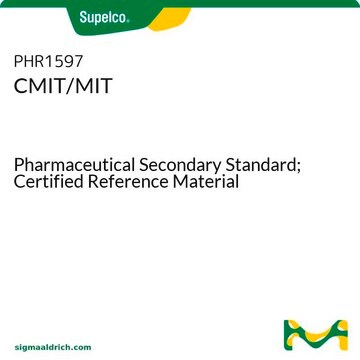73569
2-Methyl-4-isothiazolin-3-one
analytical standard
Synonym(s):
2-Methyl-3(2H)-isothiazolone
About This Item
Recommended Products
grade
analytical standard
Quality Level
Assay
≥98.0% (GCF)
shelf life
limited shelf life, expiry date on the label
technique(s)
HPLC: suitable
gas chromatography (GC): suitable
impurities
≤13.0% water (Karl Fischer)
application(s)
cleaning products
cosmetics
environmental
food and beverages
personal care
format
neat
storage temp.
2-8°C
SMILES string
CN1SC=CC1=O
InChI
1S/C4H5NOS/c1-5-4(6)2-3-7-5/h2-3H,1H3
InChI key
BEGLCMHJXHIJLR-UHFFFAOYSA-N
Looking for similar products? Visit Product Comparison Guide
General description
Application
Recommended products
Signal Word
Danger
Hazard Statements
Precautionary Statements
Hazard Classifications
Acute Tox. 2 Inhalation - Acute Tox. 3 Dermal - Acute Tox. 3 Oral - Aquatic Acute 1 - Aquatic Chronic 1 - Eye Dam. 1 - Skin Corr. 1B - Skin Sens. 1A
Supplementary Hazards
Storage Class Code
6.1A - Combustible acute toxic Cat. 1 and 2 / very toxic hazardous materials
WGK
WGK 3
Flash Point(F)
Not applicable
Flash Point(C)
Not applicable
Personal Protective Equipment
Choose from one of the most recent versions:
Already Own This Product?
Find documentation for the products that you have recently purchased in the Document Library.
Customers Also Viewed
Our team of scientists has experience in all areas of research including Life Science, Material Science, Chemical Synthesis, Chromatography, Analytical and many others.
Contact Technical Service










